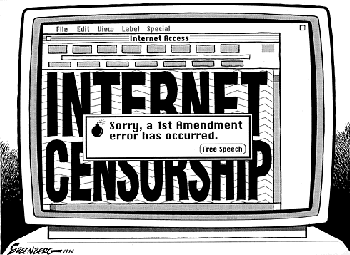In late June the Internet Corporation for Assigned Names and Numbers (ICANN), the international body that oversees the Internet address system, announced that it approved new generic top-level domain names (gTLDs). There are currently 22 general top-level domain names (.com, .org, .net, etc.), however this vote means that there will be an indefinite number.
One of the myths about the Internet is that it is completely decentralized, which is the reason that it has been celebrated as a free and democratic tool for disseminating information and connecting people. However, the organization and accessibility of sites is determined by a system, overseen by ICANN, called the Internet Assigned Numbers Authority (IANA) function. This function can be designed to foster openness or to permit censorship. In fact, ICANN attempted to use a similar expansion of domain names to censor pornography last March by approving an .xxx domain for porn sites. There are some who fear that these new domain names could also make certain sites more susceptible to government censorship. Lauren Weinstein, co-founder of People For Internet Responsibility and founder of Privacy Forum voiced several concerns on her blog. She directly addressed the issue of censorship in a statement to Radio Free Europe Radio Liberty.
“Once you start to create very fine-grained top level domains (TLDs) you create a very simple way for governments to enforce blocking and censorship on those TLDs… That’s much harder to do when you have a few general and generic ones like .com and .net,”
Over the past ten years there has been controversy surrounding who should administer the IANA function. Since ICANN was established it has received widespread criticism for being ineffective, lacking legitimacy and inadequately representing the interests of worldwide Internet users. In addition, the international community has viewed the U.S. government’s role in establishing ICANN to be hegemonic. As a result, at the 2003 UN World Summit, several countries proposed ICANN either change itself into an international organization or have an existing international organization such as the International Telecommunication Union or the UN itself take over its role. Although the U.S. government and ICANN have signed agreements in 2006 that have essentially called for the transitioning of IANA functions from the U.S. government to ICANN by this year, it is still unclear how much authority the U.S. government has in ICANN’s decisions. Many still believe that ICANN favors the United States while its Government Advisory Committee, which is composed of delegates from other nations, has no real authority.
While Internet censorship has been the subject of abundant news coverage since Arab Spring, it is important to remember that Internet censorship is not isolated to restrictive governments. While the U.S. government does not filter Internet content, many countries such as Great Britain, France, Germany and South Korea do and some fear that the U.S. and other democracies are slowly moving in that direction. As the Internet gains prominence as a medium it will continue to be threatened by various forms of censorship. However, unlike other media, Internet content can be filtered and restricted in ways not necessarily apparent to the general public.


